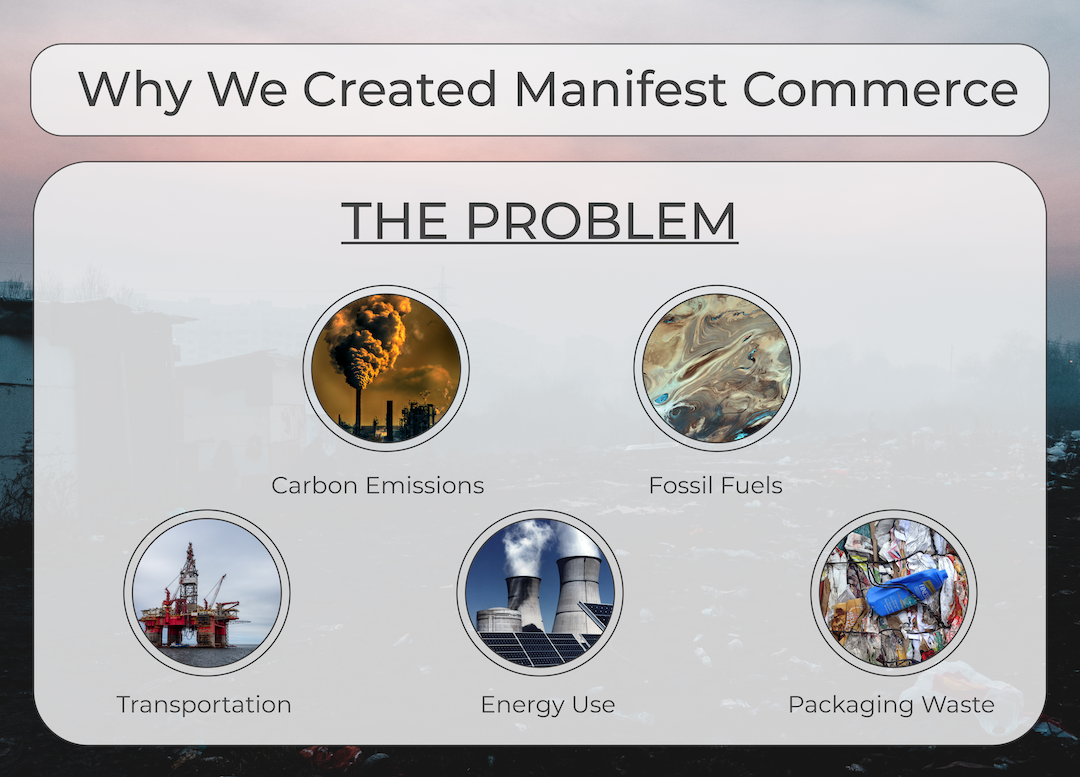With the world becoming more and more digital, the way we shop has completely changed. Whether it’s getting groceries delivered or buying a pair of shoes you have been saving up for, online shopping has made getting what we want and need almost instantaneous.
While shopaholics, busy parents, and digital natives see online shopping as a lifesaver, it isn’t all that simple. There is a dark cloud surrounding online shopping that many of us neglect to notice. The problem? E-commerce waste.
Supply chain logistics is one of the dirtiest industries threatening our earth. Think about it: with every order comes an enormous waste of packaging, carbon emissions, and warehouse energy.
We launched Manifest Commerce to provide 100% sustainable third-party logistics to omnichannel retailers. To understand why we created Manifest Commerce, we must explain the problem we are trying to solve: the supply chain’s impact on the climate crisis.
The Problem of E-Commerce Waste
Supply chain logistics have big room for improvement when it comes to sustainability. The way retailers choose to package, transport, warehouse, distribute, and dispose of waste has a huge impact on our planet.
Let’s dive into some of the biggest challenges we face in the order fulfillment process.
Carbon Emissions
Carbon dioxide emissions are the primary driver of global climate change, forcing our world to reduce our emissions quickly. Most of the world’s carbon emissions come from a small number of countries, including China, the United States, and the countries of the EU.
One way to measure our impact on climate is through a carbon footprint, which measures the total amount of greenhouse gases generated from our actions. Greenhouse gases trap heat and make our planet warmer, hence the record-breaking temperatures we’ve been experiencing!
Our global CO2 emissions are projected to rise nearly 5% in 2021 with the reopening of the economy. Our way of energy and transportation use needs to change dramatically to prevent this percentage from climbing higher and higher.
Transportation
It isn’t a surprise that transportation at any scale can negatively impact our earth, especially when transporting goods. Transportation generates the largest share of greenhouse gas emissions, stemming from burning fossil fuels to run trucks, cars, ships, and planes.
Inefficient transportation operations in the supply chain can come from unnecessary legs of transportation and utilizing wasteful carriers.
Greener carriers, as well as optimized inventory locations and routes, are the first steps towards reducing waste.
Energy Use
Warehousing operations waste enormous amounts of energy. Think about it: equipment, IT infrastructure, and lighting all use energy. The electricity, heating, and energy needed to run a warehouse can create large greenhouse gas emissions. The problem of warehousing can become more eco-friendly with more energy-efficient designs and logistics management.
Packaging Waste
With online shopping and shipments at an all-time high, there has never been more packaging waste.
The COVID-19 pandemic accelerated this waste. In 2020, total e-commerce packaging waste reached 295 million tons, 60% of which were non-recyclable plastics. These plastics will take more than 500 years to break down, clogging landfills and oceans in the meantime.
The answer to the e-commerce plastic problem can be answered with recyclable packaging and zero waste packaging materials.

The Answer to E-Commerce Waste
After learning about the toxic industry of supply chain logistics, both retailers and customers should be concerned about the future of our planet, and start demanding innovations towards sustainability.
Using an experienced 3rd party logistics company with sustainability at the top of their priority list is the first step.
What is Manifest Commerce?
Manifest was created to disrupt the dirty cycle of supply chain logistics fulfillment. Led by ShipBob co-founder, George Wojciechowski, Manifest is determined to guide retailers down a greener path by offering carbon neutral fulfillment services, zero plastics, recyclable packing materials, and green warehousing.
Order distribution, warehousing, and fulfillment services are near impossible for smaller e-commerce companies to take on in-house, let alone do this all sustainably. Manifest is an earth-friendly solution that doesn’t sacrifice efficiency.
Manifest offers retailers of all sizes services for sustainable fulfillment, seamless tech integrations, and optimized warehouse management. We create a greener supply chain through every step to delivery:
- Zero plastic, biodegradable and recyclable materials
- Partnership with Eco-Cart for carbon offsets to ensure carbon neutrality
- Green warehousing
Manifest hopes to inspire change throughout the entire supply chain and logistics industry; our earth depends on it.

